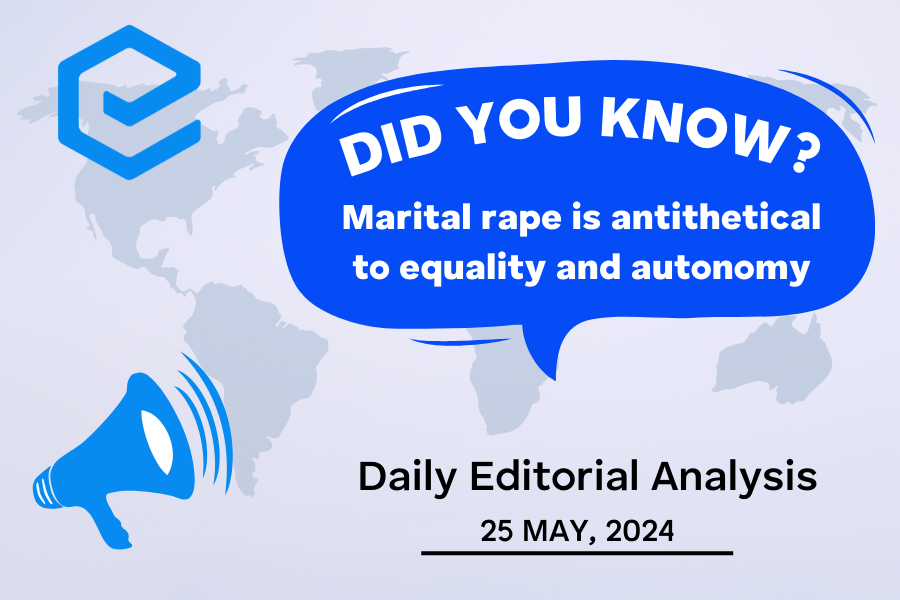
Marital rape is fundamentally opposed to the principles of equality and autonomy. In a marriage, both partners should have equal rights and the freedom to make decisions about their own bodies. When one partner forces the other into sexual activity without consent, it strips away that person’s autonomy and control over their own body. This not only causes immense physical and emotional harm but also creates a power imbalance in the relationship. True equality in a marriage means respecting each other’s boundaries and ensuring that both partners feel safe and valued. Marital rape destroys this balance, making it a serious violation of human rights.
Tag: GS-1
In News: The recent judgment handed down by the Madhya Pradesh High Court has reignited discussions across India on whether marital rape should be made a criminal offense.
Contents
Renewed Debate on Marital Rape in India: A Constitutional and Societal Imperative
- Introduction
- The recent ruling by the Madhya Pradesh High Court in the case of Manish Sahu vs State of Madhya Pradesh has reignited the debate on whether marital rape should be considered a criminal offense in India.
- Legal Framework and Recent Amendments
- Exception 2 of Section 375 of the Indian Penal Code (IPC) exempts sexual acts between a husband and his wife aged 18 or older from rape charges.
- The Supreme Court amended this provision in Independent Thought vs Union of India (2017), raising the age to 18.
- However, the Bhartiya Nyaya Sanhita of 2023, set to replace the IPC, has not addressed marital rape, leaving it legal.
- Contrasting High Court Rulings
- The Chhattisgarh High Court, in Dilip Pandey & others vs State of Chhattisgarh (2021), stated that sexual acts by a husband with his wife, even if forced, do not constitute rape.
- Conversely, the Gujarat High Court, in Nimeshbhai Bharatbhai Desai vs State of Gujarat (2018), recognized the dignity of women and denounced coercive sexual acts by husbands.
- Outdated Beliefs vs Constitutional Rights
- Exception 2 of IPC Section 375 assumes irrevocable consent from wives, contradicting women’s individual agency guaranteed by the Constitution.
- Marriage does not revoke a woman’s right over her body.
- Missed Opportunities in Judicial Decisions
- In RIT Foundation vs Union of India (2022), the Delhi High Court issued a split verdict on the constitutionality of the marital rape exception.
- Justice Rajiv Shakdher emphasized women’s autonomy and the importance of consent within marriage, advocating against the exception.
- Justice C. Hari Shankar upheld the exception but shifted the responsibility to address the issue to the legislature.
- Legislative Efforts
- The Justice Verma panel recommended removing the marital rape exception, but Parliament did not accept the recommendations.
- In 2018, Shashi Tharoor introduced a bill to criminalize marital rape, but it lapsed.
- Government Stance
- The Union government hesitates to criminalize marital rape, fearing it could destabilize marriage.
- However, evolving perspectives on marriage emphasize equality and individual rights.
- Judicial Discourse
- The Supreme Court, in X vs The Principal Secretary, Health and Family Welfare Department, Government of NCT of Delhi (2022), recognized intimate partner violence, including marital rape, as a harsh reality.
- Conclusion
- A Constitutional challenge to the marital rape exception is pending before the Supreme Court.
- It urges reflection on whether India should uphold outdated patriarchal norms or strive for a rights-based society where laws apply equally to everyone.
Source: Mint
FAQ 1: What is marital rape?
Answer: Marital rape is when one spouse forces the other to have sex without their consent. It is a form of sexual violence and abuse that happens within a marriage.
FAQ 2: Why is marital rape considered a violation of equality?
Answer: Marital rape violates equality because it disregards the rights of one spouse, usually the wife, treating her as if she has no control over her own body. In a truly equal relationship, both partners should have the same rights, including the right to say no to sex.
FAQ 3: How does marital rape undermine personal autonomy?
Answer: Personal autonomy means having control over your own body and decisions. Marital rape takes away this control, forcing one partner to engage in sexual activity against their will. This strips away their freedom to make choices about their own body.
FAQ 4: Isn’t sex a part of marriage? Why is marital rape an issue?
Answer: While sex can be an important part of marriage, it must always be consensual. Both partners need to agree to it willingly. Marital rape is an issue because it involves sex without consent, which is a form of violence and abuse.
FAQ 5: How can we support victims of marital rape?
Answer: Supporting victims involves believing them, offering emotional support, and helping them access resources such as counseling, legal aid, and shelters. It also means advocating for laws that recognize and punish marital rape to ensure victims can seek justice.
In case you still have your doubts, contact us on 9811333901.
For UPSC Prelims Resources, Click here
For Daily Updates and Study Material:
Join our Telegram Channel – Edukemy for IAS
- 1. Learn through Videos – here
- 2. Be Exam Ready by Practicing Daily MCQs – here
- 3. Daily Newsletter – Get all your Current Affairs Covered – here
- 4. Mains Answer Writing Practice – here

